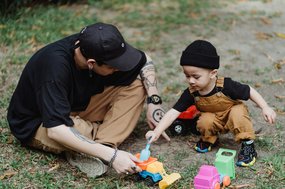
Fathers today are more involved in their children’s lives than ever before, and their engagement in early learning activities like playing, reading, singing, drawing and visiting parks or libraries supports children’s emotional, cognitive and educational development, as well as their early language and literacy skills.
Our last report focusing on fathers’ contributions to children’s literacy was in 2009. Since then, a lot has happened that influenced family life in the UK, including the COVID-19 pandemic, the cost-of-living crisis, and challenges in the early years workforce. This report revisits and updates what we know about fathers’ engagement in their children’s early language and literacy. It uses findings from a series of surveys conducted between 2019 and 2024 to explore fathers’ engagement in key early learning activities with children aged from birth to five.
Key findings:
Engagement in activities in 2024
- 3 in 4 (76.8%) fathers said they had chatted with their child daily in the last week. Almost 3 in 5 (57.6%) had played and about 1 in 2 (47.4%) read with their child every day.
- In 2024, more mothers than fathers engaged in almost all home learning activities daily, with the largest gap in singing (12.2 percentage points). However, slightly more fathers than mothers engaged in play activities (by 2.2 percentage points).
Yearly trends
- There was a downward trend in the percentage of both mothers and fathers saying they engaged at least daily in learning activities with their child between 2019 and 2024.
- Declines were more pronounced for mothers in play (-23.0 percentage points for mothers vs. -12.2 for fathers) and chatting (-12.4 for mothers vs. -8.4 for fathers), and more pronounced for fathers in singing (-21.7 percentage points vs. -13.7 percentage points for mothers).
- The downward trend in daily engagement in activities by both fathers and mothers is concerning, but it is important to avoid simplistic narratives that suggest parents are simply ‘doing less’. The Covid-19 pandemic, the cost-of-living crisis, and cuts to funding for early years services are likely to have played a significant role in this decline.
Given the lasting benefits of shared father-child engagement in early learning, these findings underscore the need to encourage and support it both at home and in the community.
What are we doing about it?
To address this, the National Literacy Trust has launched Early Words Matter (EWM), a national five-year campaign focused on helping families, practitioners and early years systems ensure all children have access to environments that support their early learning and literacy.